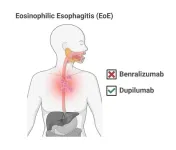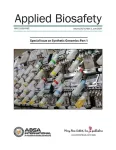(Press-News.org) A new narrative review1 led by researchers at UCL and Birmingham Children’s Hospital has found there is a lack of evidence to demonstrate the effective use of continuous glucose monitors (CGMs) in people not living with diabetes (PNLD).
In the study, published in Diabetic Medicine, researchers conclude there is currently little published evidence on how accurate CGMs are in measuring blood glucose levels in PNLD, nor sufficient evidence of what the health benefits or utility such information would provide. The researchers also suggest CGMs may have unintended adverse health effects in this user group and are now calling for better regulation.
In recent years, CGMs have helped transform the treatment of type-1 diabetes and have been used with good effect by people with type-2 diabetes who are on insulin therapy. The devices, originally developed for those with diabetes, are attached to the body and monitor blood glucose levels in real-time, transmitting the information to an insulin pump in people with type-1 diabetes that delivers the correct amount of insulin required to keep blood glucose levels within a defined range2.
For those living with diabetes, CGMs are less burdensome and offer real-time trends in glucose changes compared to older testing methods, such as regular finger prick blood tests.
However, more recently CGMs have been increasingly marketed to PNLD for uses without a medical indication, such as health, wellness and lifestyle management, with some companies providing advice around how to manage glucose levels or ‘glucose spikes’.
Explaining the current interest in CGMs, senior author and dietitian, Dr Adrian Brown (UCL Division of Medicine), said: “Several health companies are now using CGMs as part of paid-for programmes designed to give people personalised nutrition information.
“Some claim to tailor a person’s diet and activity to help keep blood glucose within ‘normal’ levels. But what constitutes a normal blood sugar level varies between individuals and in the same individuals at different times, and CGM accuracy varies between CGM models.
“With this in mind, we wanted to see what research had been undertaken into the use of CGMs in people who do not have diabetes.”
In this narrative review, the team from UCL and Birmingham Children's Hospital searched online databases (PubMed, Medline, Embase and the Cochrane Library), in the years 1980-2023, for studies examining aspects of CGM utility and performance in PNLD. They found 25 relevant studies.
Researchers then looked to establish what, if any, evidence there was on how effective CGMs were at measuring glucose levels, glucose variability and elevated glucose levels in PNLD, as well as any research on the influence of CGM use on eating behaviours.
The review concludes that there is a lack of consistent and high-quality evidence to support CGM use in PNLD. For instance, there is little evidence to show how accurate CGMs are at measuring blood glucose levels or detecting changes in PNLD, nor sufficient research into the value and utility of the CGM data obtained in PNLD.
The review also found evidence that CGM use in PNLD could cause anxiety about what is normal in terms of diet and blood sugar levels. Researchers say this could present a risk of developing eating disorders, such as orthorexia (an unhealthy obsession with eating ‘pure’ food).
An earlier separate review by the authors, referenced in this paper, looked at the regulation of CGM in people with diabetes, and found there was no specific statutory guidance available.
Dr Brown, who is based at the UCL Centre of Obesity Research, said: “While there are some benefits to personalised health programmes offered by commercial providers, including getting people to think about what and how much they’re eating, the fact is that we don’t have the same health outcome data for CGM use in people not living with diabetes.
“This review unpicks the idea of ‘abnormal glucose’, the accuracy of CGM data, and the effect on behavioural change when CGMs are used by people without diabetes.
“At the moment there are big questions about how much guidance these health companies are giving customers to help them interpret their glucose data, and what scientific evidence this guidance is based on. This can leave the customer to interpret what the variations in their blood glucose mean, posing a risk that they misinterpret the data and avoid certain foods unnecessarily.”
Co-author John Pemberton, a Specialist Paediatric Diabetes Dietitian from Birmingham Children’s Hospital who sits on the International Federation of Clinical Chemistry (IFCC) and Laboratory Medicine Working Group on CGM, said: “CGMs with an accuracy within 20% of actual blood glucose levels, at least 95% of the time, represent current market leading performance, and are extremely helpful for people with diabetes to make daily treatment decisions.
“However, the regulations for CGMs for people living with diabetes are ambiguous both nationally and internationally, making it difficult to know if available CGMs meet this level of accuracy. This is why the IFCC CGM group are pushing for an international standard.
“For individuals not living with diabetes, the situation is even more uncertain. We have little robust information on whether CGMs achieve the required accuracy in this population.
“Normal glucose levels for individuals without diabetes range from 3.3 to 7.8 mmol/L and the most accurate CGMs have a 20% accuracy margin most of the time. This means that the most accurate CGM devices will display readings between 2.6 and 9.4 mmol/L, even when the actual glucose level is within the normal range. Such discrepancies can lead to unintended stress and potential psychological and behavioural implications.
“While CGMs for people not living with diabetes show promise, the accuracy, regulatory standards, and psychological impacts of false highs and lows are not well understood. Despite this, CGMs are being heavily promoted without mention of these issues.”
For more information, please contact:
Dr Matt Midgley
+44 (0)20 7679 9064
m.midgley@ucl.ac.uk
1A narrative review provides a comprehensive summary and synthesis of existing literature on a specific topic, highlighting key findings, trends, and gaps in the research.
2 In general, the more people with diabetes can keep their blood sugar within defined limits (not too high or too low, aiming to achieve at least 70% of readings between 3.9-10.0 mmol/L), the less likely they are to develop diabetes-related complications such as eye and kidney problems.
Publication:
Zhanna Oganesova, John Pemberton and Adrian Brown. ‘Innovative Solution or Cause for Concern? The use of Continuous Glucose Monitors in People not living with diabetes: A Narrative Review’ is published in Diabetic Medicine and is strictly embargoed until Thursday 27 June at 00:01 BST / Wednesday 26 June at 19:01 ET.
DOI: https://doi.org/10.1111/dme.15369
About UCL – London’s Global University
UCL is a diverse global community of world-class academics, students, industry links, external partners, and alumni. Our powerful collective of individuals and institutions work together to explore new possibilities.
Since 1826, we have championed independent thought by attracting and nurturing the world's best minds. Our community of more than 50,000 students from 150 countries and over 16,000 staff pursues academic excellence, breaks boundaries and makes a positive impact on real world problems.
The Times and Sunday Times University of the Year 2024, we are consistently ranked among the top 10 universities in the world and are one of only a handful of institutions rated as having the strongest academic reputation and the broadest research impact.
We have a progressive and integrated approach to our teaching and research – championing innovation, creativity and cross-disciplinary working. We teach our students how to think, not what to think, and see them as partners, collaborators and contributors.
For almost 200 years, we are proud to have opened higher education to students from a wide range of backgrounds and to change the way we create and share knowledge.
We were the first in England to welcome women to university education and that courageous attitude and disruptive spirit is still alive today. We are UCL.
www.ucl.ac.uk | Follow @uclnews on Twitter | Read news at www.ucl.ac.uk/news/ | Listen to UCL podcasts on SoundCloud | View images on Flickr | Find out what’s on at UCL Mind
END
Use of glucose monitors by people not living with diabetes needs more regulation
2024-06-27
ELSE PRESS RELEASES FROM THIS DATE:
Two studies shows mixed progress against EoE
2024-06-27
Despite high hopes, a drug that wipes out the namesake cell type associated with the disease eosinophilic esophagitis (EoE) doesn’t make patients feel better and doesn’t reverse tissue damage in their throats.
Meanwhile, data show that a different drug that had previously been approved for use in adults and teens with EoE is also safe and effective for children under 12 who weigh at least 15 kg (about 33 pounds).
The results of these clinical trials—plus an accompanying editorial—appear in the June 17, 2024, edition of The New England Journal of Medicine.
“Together, these trials provide exciting advances in our understanding of, and treatment options for, ...
Specific bacteria in your gut are involved in compulsive eating and obesity
2024-06-27
Vienna, Austria: An international team of researchers has identified specific bacteria in the gut that are associated with both mice and humans developing an addiction to food that can lead to obesity. They have also identified bacteria that play a beneficial role in preventing food addiction.
The research is presented today (Thursday) at the Federation of European Neuroscience Societies (FENS) Forum 2024 and is published simultaneously in the journal Gut [1,2].
Professor Elena Martín-García, from the Laboratory of Neuropharmacology-NeuroPhar in the Department of Medicine and Life Sciences at the Universitat ...
More than a quarter of ‘healthy’ over-60s have heart valve disease, according to new research
2024-06-27
Almost 4,500 healthy and symptom-free over-60s were examined, with 28pc found to have heart valve disease
Age was found to be strongly associated with an increased incidence of significant heart valve disease
Study lays the foundation for more research into the potential role of screening in the elderly population
Peer-reviewed – Prospective Cohort Study - People
The sheer scale of undiagnosed heart valve disease in our ageing population has been revealed for the first ...
Sylvester Cancer Tip Sheet - June 2024
2024-06-26
BLOOD CANCER
Sylvester Expert Endorses FDA’s Recent Cancer Drug Approval
Mikkael Sekeres, M.D., chief of the Division of Hematology at Sylvester, who specializes in treating leukemia and myelodysplastic syndromes (MDS), expressed his support for the Food and Drug Administration’s recent approval of the drug imetelstat. The drug, a telomerase inhibitor, treats cancer-related anemia in patients with lower-risk MDS. “With approval of imetelstat to treat myelodysplastic syndromes, we finally have another approach ...
Playing youth sports linked to better mental health in adults
2024-06-26
COLUMBUS, Ohio – Adults who continuously played organized sports through their youth have fewer symptoms of anxiety and depression than those who never played or those who dropped out, a new study finds.
And those who dropped out of sports had poorer mental health than those who never played at all.
But many more people drop out of youth sports than play continuously until they are 18, said Chris Knoester, senior author of the study and professor of sociology at The Ohio State University.
“If you play and stick with sports, it’s ...
Researchers find genetic stability in a long-term Panamanian hybrid zone of manakins
2024-06-26
We often think of species as separate and distinct, but sometimes they can interbreed and create hybrids. When this happens consistently in a specific area, it forms what’s known as a hybrid zone. These zones can be highly dynamic or remarkably stable, and studying them can reveal key insights into how species boundaries evolve—or sometimes blur. In a new study published in Evolution, researchers at the University of Illinois Urbana-Champaign describe a hybrid zone between two manakin species in Panama that ...
Special Issue of Applied Biosafety focuses on synthetic genomics
2024-06-26
In its first special issue on Biosafety and Biosecurity Considerations of Synthetic Genomics, the first part of a two-part special issue of the peer-reviewed journal Applied Biosafety focuses on the growing availability of customizable nucleic acid sequences and genomes from commercial sources. The issue also describes the advancements in desktop synthesis devices that enable the creation of on-demand nucleic acids. Click here to read the special issue now.
The rapid technological advancements described in part one of this two-part special issue are raising concerns among biosecurity experts and policymakers. The manuscripts in this issue explore the challenges, opportunities, and ...
Simple new process stores CO2 in concrete without compromising strength
2024-06-26
By using a carbonated — rather than a still — water-based solution during the concrete manufacturing process, a Northwestern University-led team of engineers has discovered a new way to store carbon dioxide (CO2) in the ubiquitous construction material.
Not only could the new process help sequester CO2 from the ever-warming atmosphere, it also results in concrete with uncompromised strength and durability.
In laboratory experiments, the process achieved a CO2 sequestration efficiency of up to 45%, meaning that nearly ...
Osiris 39 examines the role of disability in the history of science
2024-06-26
Disability studies has gained prominence in recent years, transforming fields ranging from design to literary studies with insurgent approaches to access and representation. The newest volume of Osiris, “Disability and the History of Science,” extends this movement to ask how disability has been a central, if unacknowledged, force in the scientific disciplines and the history of science. The volume examines the many roles that disability and disabled people have played throughout the history of science, calling attention to the shaping of scientific knowledge production by disability.
Editors Jaipreet Virdi, Mara Mills, and Sarah F. Rose, in their introduction ...
AI-based Alphafold: Its potential impact on predictive medicine
2024-06-26
AlphaFold is an outstanding example of artificial intelligence’s computational capabilities in accurately predicting intricate protein structures. A new Review article explores AlphaFold’s recent advancements and its potential impact on predictive medicine. The article is published in the peer-reviewed journal AI in Precision Oncology. Click to read the articles now.
Vivek Subbiah, MD, from the Sarah Cannon Research Institute, and coauthors, describe a shift toward predictive medicine, in which AI, integrated with genomic data, ...





